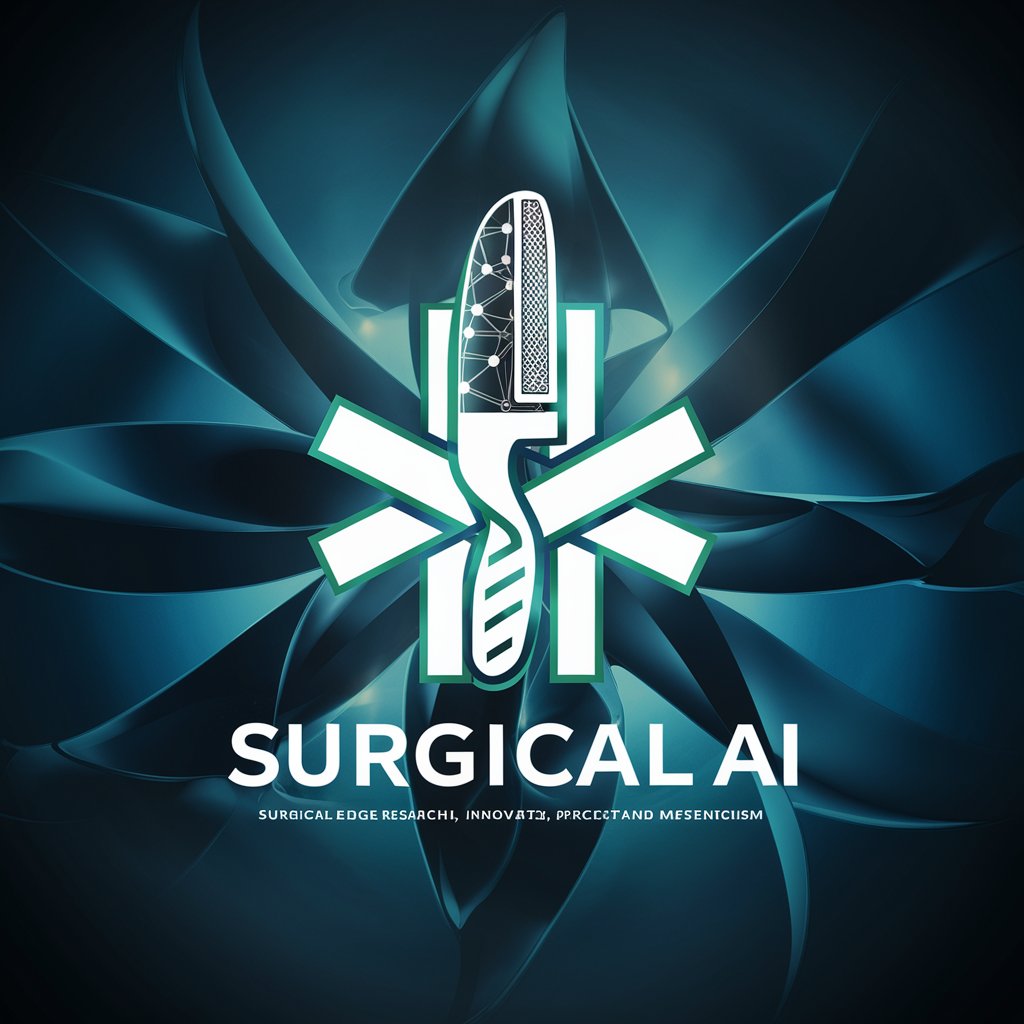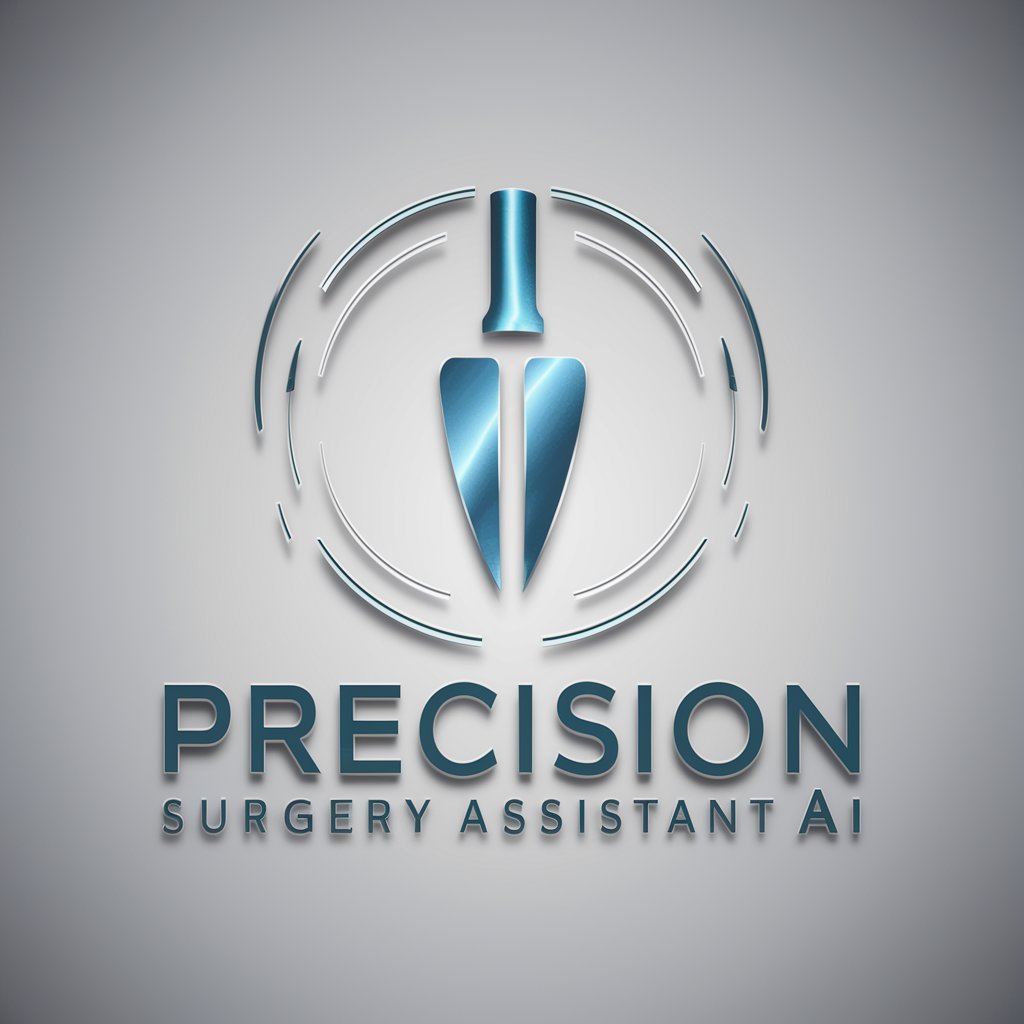
Surgical AI - AI-powered Surgical Support

Welcome to Surgical AI, your partner in advancing surgical excellence.
Empowering Surgery with AI
Can you explain the role of AI in enhancing surgical precision?
What are the latest advancements in surgical technology?
How can AI improve patient outcomes in surgery?
Describe the ethical considerations of using AI in surgical practices.
Get Embed Code
Introduction to Surgical AI
Surgical AI is designed as an advanced technological framework intended to augment the capabilities of surgeons, healthcare professionals, and medical researchers. At its core, Surgical AI integrates artificial intelligence with surgical practices to enhance decision-making, precision, and outcomes in various medical procedures. It encompasses a range of functionalities from pre-operative planning and simulation to real-time assistance during surgeries and post-operative analysis and follow-up. For example, Surgical AI can analyze medical images using deep learning algorithms to identify and map out surgical targets, assist in robot-assisted surgeries by providing real-time data to the surgeon, or simulate complex surgical procedures for training purposes. Powered by ChatGPT-4o。

Main Functions of Surgical AI
Pre-operative Planning and Simulation
Example
Using 3D models generated from patient scans, Surgical AI can simulate different surgical approaches, allowing surgeons to plan the most effective intervention strategies.
Scenario
In a scenario where a patient requires a complex orthopedic surgery, Surgical AI can simulate the surgical procedure on a 3D model of the patient's skeletal structure, helping the surgical team to understand the nuances of the patient's anatomy and plan the surgery to minimize risks and improve outcomes.
Intra-operative Assistance
Example
Integration with robotic surgery systems to provide enhanced visualization, precision, and control during operations.
Scenario
During a minimally invasive surgery, Surgical AI can process real-time imaging to highlight anatomical structures and potential hazards, guiding the surgeon's movements through a robotic system to ensure accuracy and reduce the risk of complications.
Post-operative Monitoring and Analysis
Example
Analyzing patient data post-surgery to predict recovery outcomes, identify complications early, and personalize follow-up care.
Scenario
After a cardiac surgery, Surgical AI algorithms can monitor the patient's vital signs, wound images, and other health indicators to detect signs of infection or complications early, enabling timely intervention and personalized care plans.
Ideal Users of Surgical AI Services
Surgeons and Surgical Teams
These professionals are at the forefront of utilizing Surgical AI, leveraging it for enhanced surgical planning, precision in operations, and improved patient outcomes. Surgical AI's ability to provide detailed analysis and real-time assistance makes it invaluable for surgeons looking to optimize their procedures and reduce intra-operative and post-operative risks.
Medical Researchers
Researchers focusing on medical and surgical innovations can use Surgical AI to analyze large datasets for patterns, outcomes, and potential improvements in surgical techniques. Surgical AI serves as a tool for advancing research in robotic surgery, personalized medicine, and surgical outcomes.
Healthcare Training Institutions
Medical schools and training programs can incorporate Surgical AI into their curriculum to provide students with realistic simulations and virtual training environments. This hands-on experience with AI-driven tools prepares future healthcare professionals for the technological advancements in surgery.

How to Use Surgical AI
Start Free Trial
Initiate your journey at yeschat.ai to experience Surgical AI without the necessity of signing up or subscribing to premium services.
Explore Features
Navigate through the platform to explore various features tailored for surgical research, practice, and education. Familiarize yourself with tools designed for case analysis, data interpretation, and procedural planning.
Access Educational Content
Utilize the platform's rich library of educational materials and case studies to enhance your surgical knowledge and skills.
Engage with Community
Join discussions, share insights, or ask questions in the community forums to engage with other professionals and enhance your learning experience.
Apply Insights
Incorporate the insights and data gathered from Surgical AI into your clinical practice, research, or academic work to improve outcomes and innovate.
Try other advanced and practical GPTs
Bay Area
Explore the Bay with AI-driven Insights

San Francisco
Your AI-powered San Francisco Insider

SF Sage
Empowering Salesforce Success with AI

アダチさん28号(IT業務知識:製造業篇)
Empowering Manufacturing with AI-Driven IT Insights

アダチさん27号(IT業務知識:流通業・物流業篇)
Streamlining IT in Distribution and Logistics

Agente de Optimización de Hábitos de Venta (AOHV)
Elevate Sales with AI-Powered Habit Optimization

FASE Method Assistant
Empower Your Productivity with AI

Analía Orts
Engage with Edge: AI-Powered Sarcasm

Galactinet Content Master Plan
Elevate your content with AI-driven insights.

SN Sage
Empowering ServiceNow Users with AI

ZizekGPT
Unleashing Zizek's Wit in AI Form

The Leaky Cauldron
Stirring Magic into Every Chat

Surgical AI Q&A
What is Surgical AI?
Surgical AI is an advanced tool designed to support and enhance surgical practice, research, and education through artificial intelligence. It provides data-driven insights, procedural guidance, and educational resources.
How does Surgical AI integrate into clinical practice?
Surgical AI integrates into clinical practice by offering real-time data analysis, predictive modeling for patient outcomes, and personalized procedural recommendations to assist surgeons in decision-making.
Can Surgical AI be used for educational purposes?
Absolutely. Surgical AI serves as a powerful educational tool, offering access to a wide range of case studies, interactive modules, and the latest research findings to facilitate learning and teaching.
Is Surgical AI applicable to all surgical specialties?
Yes, Surgical AI is designed to be versatile, catering to various surgical specialties by providing specialty-specific data, guidelines, and support for a broad spectrum of procedures.
How does Surgical AI ensure data privacy and security?
Surgical AI prioritizes data privacy and security through robust encryption methods, compliance with healthcare regulations, and secure data handling practices to protect sensitive patient information.





